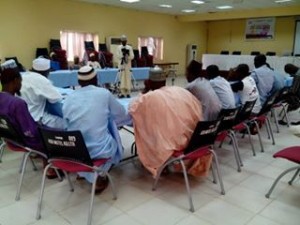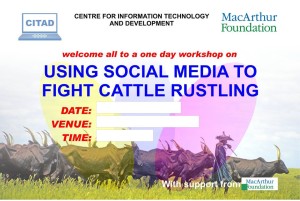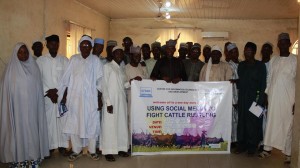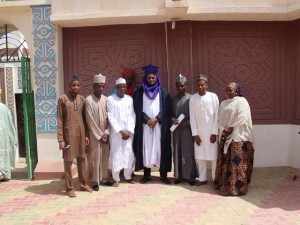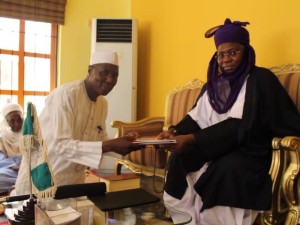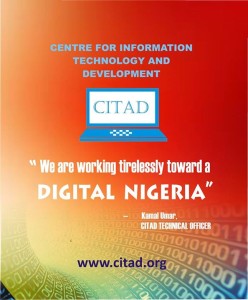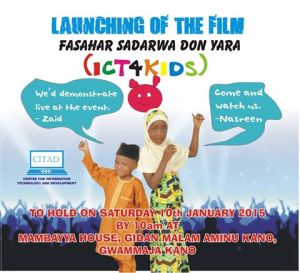Introduction
The Coordinating Committee on Hate Speech comprising of MacArthur Foundation, NSRP and CITAD on 23rd March held a one-day Stakeholders Forum on hate speech and the 2015 elections in Nigeria. It was conducted at the Board Room of Yaradua Centre, Abuja. It brought together civil society activists, media practitioners and regulators, political parties’ representatives, and human rights activists.
Attended by 45 people from various stakeholder organizations, the meeting had the goal ‘share understanding of the frame work on hate/ dangerous speech monitoring and categorisations and to identify other gaps that may possibly be filled up before the general elections in areas of dissemination of findings’. The specific objectives were:
- Share findings of  what is happening in terms of hate / dangerous speech
- Provide information about the work everyone is doing to counter hate / dangerous speech
- Think together what else can be done before  the elections and also in the long term
Opening
The Forum commenced with a welcome remarks by Princilla Anut, the Deputy Project Manager who was represented by Lauratu Abdulsalam. She welcomed the participants to the meeting and expressed her appreciation that in spite of the many events happening that they, the participants opted to honor our invitation.
Discussion
The first session was chaired by Saudatu Mahdi of WRAPA. In her opening remarks, she drew attention to the fact electioneering campaign in the country was suffused with hate speech and that we needed to do something to ensure that this did not degenerate to violence. She he invited Y. Z. Ya’u of CITAD to set the scene for the meeting, in setting the scene for the meeting, YZ said that this was a follow up to the earlier conference held in January at the end of which several organizations pledged to carry various activities around curbing hate speech., he said that the meeting today was to provide an opportunity for the different organizations to share  their experiences in the last two months, explain their successes and key challenges and for the meeting to collectively discuss on how to overcome these challenge, the forum he added would also allow the stakeholders to identify gaps as to areas left uncovered and develop better collaboration strategies and mechanisms for working together reduce hate speech in Nigeria political landscape. He added that although the meeting was holding just four days to the election, it was important to note that often the consequence of hate speech was usually felt more following election than during the campaign period when the statement made.
- Z. Ya’u then discussed the framework for the monitoring of hate speech in the country. He outlined the key attributes for the identification of hate speech in the Nigerian context. In the Nigerian context, he sees dangerous speech any speech act that is aimed at inciting the audience to denigrate against people others of the basis of ethnicity, religion, gender, geography and any other socially conceived parameter with the purpose of marginalizing them or placing them at some disadvantage that is contrary to the provisions of the universal declaration on human rights as well as the international covenants on rights of the people. Substantively, dangerous/hate speech in the Nigerian context is a speech act has that:
- Insults people for their religion
- Abuses people for their ethnic or linguistic affiliation
- Expresses contempt against people because of their place of origin
- Disparages or intimidates women or girls because of their gender
- Condones discriminatory assertions against people living with disability
- Abuses or desecrates symbols of cultural or religious practices
- Denigrates or otherwise ridicules traditional or cultural institutions of other people
- Deliberate spread falsehood or rumours that demeans or maligns or otherwise ostracizes other people on the basis of religion, ethnicity, gender or place of origin for the accident of one form of disability or the other
He then linked this to the Susan Benesch frame work in outlining the Hate and dangerous speech in Nigerian context which provides the basis for the categorization used in the monitoring of the hate speech by CITAD. He also informed that while adapting the UMATI coding framework, CITAD had added a couple of things including gender related aspects of danger speech.
In the last segment of his presentation, he gave out the key findings of the monitoring that CITAD had on hate speech for the period covering January to Mid-March, 2015. Among these were:
- That about 70% of the people disseminating hate speech in the Nigerian social media space uses their identity and can therefore be reached in case of countering and follow up actions
- That 76% of the hate speeches in Nigerian social media space were transmitted through face book either as a post in a private Page/group ,a Post in a public page/group or  a response to a post/forum, followed by online articles and twitter respectively.
- English language is the major language used for dissemination of hate and dangerous speeches with a visible content in Hausa Language in the Nigerian Social media space.
- Over 65% of hate speech practitioners were males with female making a small %
- Greater percentage of the contents the posts uses a coded language and had been used in the fast and led to violence/harm.
- There a number of messages circulated whose circulation earlier had caused violence in the country
This session was followed with comments and questions from the audience and was responded by Y.Z Yau
The second session was to be chaired by Prof. Chidi Odinkalu, who he had to leave mid-way as the Human Rights Commission had an appointment with Chief of Staff, thus in his place Dayo Olaide of MacArthur Foundation chaired,. But he before leaving Prof. Chidi Odinkalu made his contribution by first commending the organizers of the event, noting its significance in our efforts to ensure that we keep the peace. This session was chaired by Prof. Chidi Odinkalu the Chairman of National Human Rights Commission (NHRC). During this session Prof Chidi Odinkalu, who represented the Human Rights Commission, expressed concerned over the failure of political leaders in the country. Said political leaders have failed Nigerians and accused both General Muhammadu Buhari, the APC’s presidential flag bearer and President Good luck Jonathan, the PDP’s presidential flag bearer of not doing anything against those propagating hate speeches, in their names. Nigeria’s unity is not negotiable, politicians are destroying our country and we seem helpless. He added that the NHRC would come up with an accountability report after the 2015 General Elections, and warned that 2015 would be the last time politicians would commit electoral violence, hate speech as well as electoral malpractices and got away with it. He said he the NHRC which had been monitoring hate speech among other thing was ready to partner with CITAD and other to push for legislation that will criminalize hate speech with clear. NHRC would come up with an accountability report after the 2015 General Elections, and warned that 2015 would be the last time politicians would commit electoral violence, hate speech as well as electoral malpractices and got away with it
The session received presentations from the Press Council and APCON. Also speaking at the forum, Mal Ahmed Yelwa of the Advertising Practitioners Council of Nigeria, APCON, said they were on daily basis receiving complaints from both APC and PDP concerning hate speeches and added that his council never authorized any advertisement that was contrary to Nigerian laws. The APCON Representative lamented that the organization did not have the power to “organizations, we can only fine media organizations. If we had powers to close down media organizations, the level of compliance would have been increased,†complained Mr.  Yelwa. He also mentioned that fines were too low and too easily paid by offenders.
The Nigeria Press made a presentation of its work on monitoring of the media. Presented by Mr. Nnamdi Njemanze, the full report, which was to be circulated later by email to participants, focused more on compliance of the media with ethics than just hate speech. The NPC monitors a couple of newspapers and magazines and assess them along certain themes such as balance, professional ethics, gender and languages. It is under language that hate speech comes under. He said that the organization issues a monthly report of its monitoring and invites stakeholders to take action based on the findings. The work of the NPC however, like NBC and APCON was hampered by the factor that law establishing them do not provide them with sufficient power to deal with erring journalists or media house.
The third session was chaired by Dr. Kole Shettima and was meant for stakeholders to share their experience in dealing with hate speech. There were:
- CITAD: The CITAD’s Program officer in charge of peace project Malam A.R Maidumbayya presented their efforts on countering Hate and dangerous speech. He out line four major strategies deployed by the organization in hate speech countering efforts such as:
- Influencing the Speaker through Counter speech in unison: In this methodology each monitor is assigned to engage two consistent hate speakers from among his source list. The monitors uses soft language to call on the hate speakers to order by outlining the danger of what he usually  post in the social media space and call on him/her to embrace peaceful alternatives for expressing his/her  views in public.
- Developing Audience Resistance to Dangerous Speech: Civil society organizations, media houses and influential leaders or co can force an influential dangerous speaker to withdraw certain hate speech incidences by speaking out loud against it, creating critical mass around the issue through massive condemnation and call for withdrawal of the speech. Using this methodology CITAD quickly responds to dangerous speeches made by high public figures through organizing press conferences in various offices, calling on its partners and other civil society organizations to do the same and calling on media houses to create critical mass around the issue with the sole aim of compelling the individual to denounce or reverse his comment before the public
- Counter speech By Influential Leaders: It is established that some of the indicators of successful counter speech are the same as the indicators of dangerousness for inflammatory speech. For example, there is evidence of success when a speaker with influence over the relevant audience gives a strong signal of disapproval of inflammatory speech – or of violence itself its, the audience tends to agree with him not to react to such a speech. In recognition of that CITAD raises media team to meet numerous community leaders ,celebrities and religious leaders ,get peace messages from them ,the media tem presents those messages in and interesting info graphical messages and promote the same via various social media platforms of the organization. In line with this CITAD made this visit to almost all the influential emirs of all the traditional states in the North east and the Northwest taking their powerful peace messages to the public. The team also introduces those among them that has presence in social media to CITADs various peace platforms in the social media and encourages them to make use   of them for campaign against hate speech
- Counter speech to refute falsehoods and supply reliable information-Adopting the Kenyan Uchaguzi.
- Reporting to Regulatory Agencies
- TMG which represented its report which countering a section on hate speech: Mr Salami who represented TMG shade light on how they deployed thousands of volunteers across the country who reports critical incidences of hate speeches in mass media, political rallies and other ]traditional medium. TMG make use of Rapid SMS technology in reporting the incidences from across the country which display its self automatically in to the dash board of TMG’s National information center. He expresses the trends in the incidents of hate speech across the different geopolitical zones of the country. He father restated that the incident of dangerous speech by politicians is ‘in the increase as the 2015 election draws closer.
- Office of HCHR: Mrs Adwoa Kufuor of the OHCHR made brief intervention that the office had been concerned about human rights situation in the context of the election and had been monitoring the situation IN Nigeria. The office welcomed the concern of this forum with hate speech as hate speech had been known to cause violence in many settings. She said the office was ready to collaborate with stakeholders in the efforts to curb hate speech in the media
- The APC Media Office represented by Alaba Yusuf made remarks on the fact that his party had been at the receiving end of hate speech especially by the government control media and have been denied opportunities by these organizations to even respond. He disclosed that the party had made formal complaints to the regulation agencies such as the NBC and APCON but so far no action has been taken
- The APC Campaign Committee represented Mrs. Lauretta Onochie: briefed the meeting of how the campaign office has made efforts to popularize the Peace Accord among campaign coordinators at the grassroots level by
- Although PDP was represented by the Special Adviser to the President on Police, Prof Rufai Alkali, he left without making any presentation or leaving any represented to make intervention
The final session which originally was meant to hear from security and law enforcement agencies was changed to an open session as these stakeholders did not. The session was chaired by Chitra Nagarajan of NSRP. Issues raised during the session included:
- Need to review the laws setting up some of the media regulatory agencies
- Indeed for media regulatory agencies to take onboard online advertising
- Need for closer collaboration among those involved  in efforts to curb hate speech in our media
- Sharing more strategies for countering hate speech
- The need for media unions to protect the jobs of their members who are victims for upholding professional ethics
- There was need for the NBC and the Press Council should operate in a more even-handed way in meting out sanctions to federal, state and private broadcasters
- The disregard of the requirement for APCON certificate to appended to advert submissions by media organizations
- The overbearing influence on political figures on media managers during campaign
Recommendations: arising from the Meeting
- That more efforts needed to prepare against the upcoming elections of 2015
- That concerted efforts needed to bring the perpetrators to book should any one uses dangerous speech
- That regulatory agencies must be more proactive in exercising their constitutional rights of prosecuting the culprits
- That there must be synergy between the various regulatory agencies to combat hate and dangerous speech in the mass media
- The enabling laws of the regulatory agencies should be reviewed and be amended to prove steeper fines and sanctions for media houses disseminating dangerous speech must be reviewed
- That there is there need to collectively push for a specific legislation against hate speech following the elections
- That partners would continent to collaborate in seeking efforts to curb hate speech in the country
- That media organizations must insist to have APCON certificate before placement of adverts

